Faculty Research Highlights
Susannah Abbey to publish Counteradaptations with UNM Press
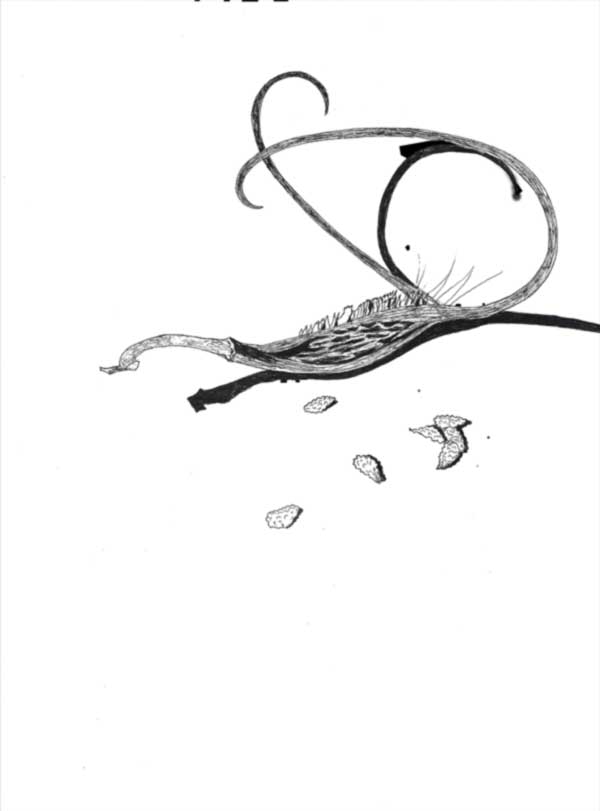 Susannah Abbey (Lecturer, Landscape Architecture) will be publishing a book, Counteradaptations: Agroecology and Seed Sharing in Arid America, with UNM Press in the Spring of 2027. This book explores seed saving in the context of agroecology and food sovereignty in Arid America, a region hit particularly hard by misuse and climate change. In many ways the deserts of the U.S. and Mexico can serve as an object lesson for others: what new constraints are we dealing with here, and how can we grow our food and medicine plants better in the new reality? Counteradaptations explores our relationship to seeds and plants, beginning early domestication, the Spanish entrada and the Columbian exchange to the present day. It focuses on those species of plant we have thought important enough to cultivate, to domesticate, to bring along with us on our travels, to offer as gifts to friends and allies.
Susannah Abbey (Lecturer, Landscape Architecture) will be publishing a book, Counteradaptations: Agroecology and Seed Sharing in Arid America, with UNM Press in the Spring of 2027. This book explores seed saving in the context of agroecology and food sovereignty in Arid America, a region hit particularly hard by misuse and climate change. In many ways the deserts of the U.S. and Mexico can serve as an object lesson for others: what new constraints are we dealing with here, and how can we grow our food and medicine plants better in the new reality? Counteradaptations explores our relationship to seeds and plants, beginning early domestication, the Spanish entrada and the Columbian exchange to the present day. It focuses on those species of plant we have thought important enough to cultivate, to domesticate, to bring along with us on our travels, to offer as gifts to friends and allies.
Susannah Abbey is a lecturer in Landscape Architecture and coordinator of the Summer Design Academy. She is also a freelance writer, with contributions to publications such as Hyperallergic and Landscape Journal.
Susannah Abbey and Anthony Fettes Present on Community Engagement in the Indigenous Design Studio at CELA
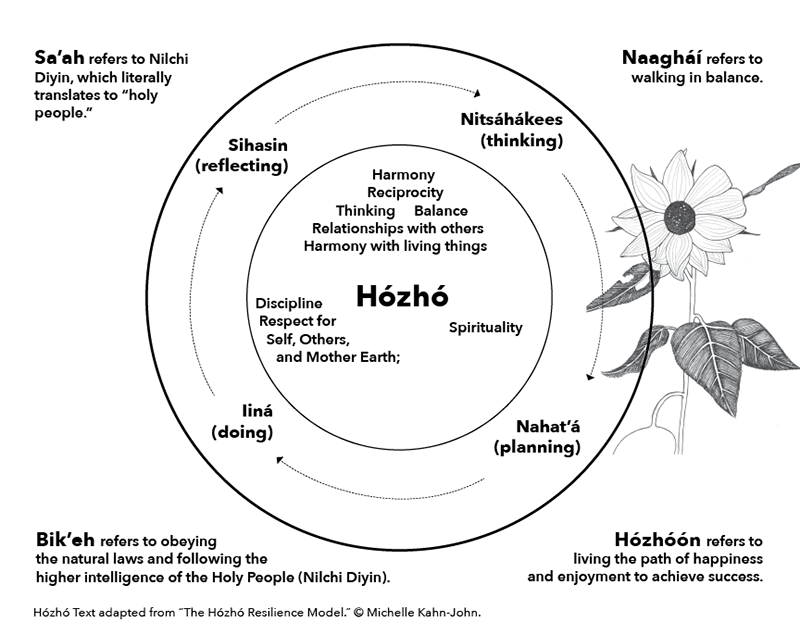 Susannah Abbey (Lecturer, Landscape Architecture) and Anthony Fettes (Assistant Professor, Landscape Architecture) co-presented the paper “Designing for Hózhó – Reciprocity, Water, and Well-being" with Kenneth Kokroko and Matthew Tafoya at the 2025 Council of Educators in Landscape Architecture (CELA) Conference in Cincinnati.
Susannah Abbey (Lecturer, Landscape Architecture) and Anthony Fettes (Assistant Professor, Landscape Architecture) co-presented the paper “Designing for Hózhó – Reciprocity, Water, and Well-being" with Kenneth Kokroko and Matthew Tafoya at the 2025 Council of Educators in Landscape Architecture (CELA) Conference in Cincinnati.
This paper analyzes the community engagement process of the Fall 2025 Indigenous Design Studio, a collaboration between Navajo Technical University, the University of Arizona, and UNM. We will assess the merits of the process from three points of view: cross-cultural experiential learning and its benefits to students, Dine epistemology and pedagogical philosophy (SNBH and Hozho), and methods of respectful research with Indigenous partners. The paper will later be offered for publication.
Susannah Abbey is a lecturer in Landscape Architecture and coordinator of the Summer Design Academy. She is also a freelance writer, with contributions to publications such as Hyperallergic and Landscape Journal. Anthony Fettes is an Assistant Professor of Landscape Architecture; his teaching and research explore the connections between culture, ecology, and place.
SA+P celebrates Tim Castillo, director of Office of Community Engagement, for the Renewal of UNM’s Carnegie Classification for Community Engagement
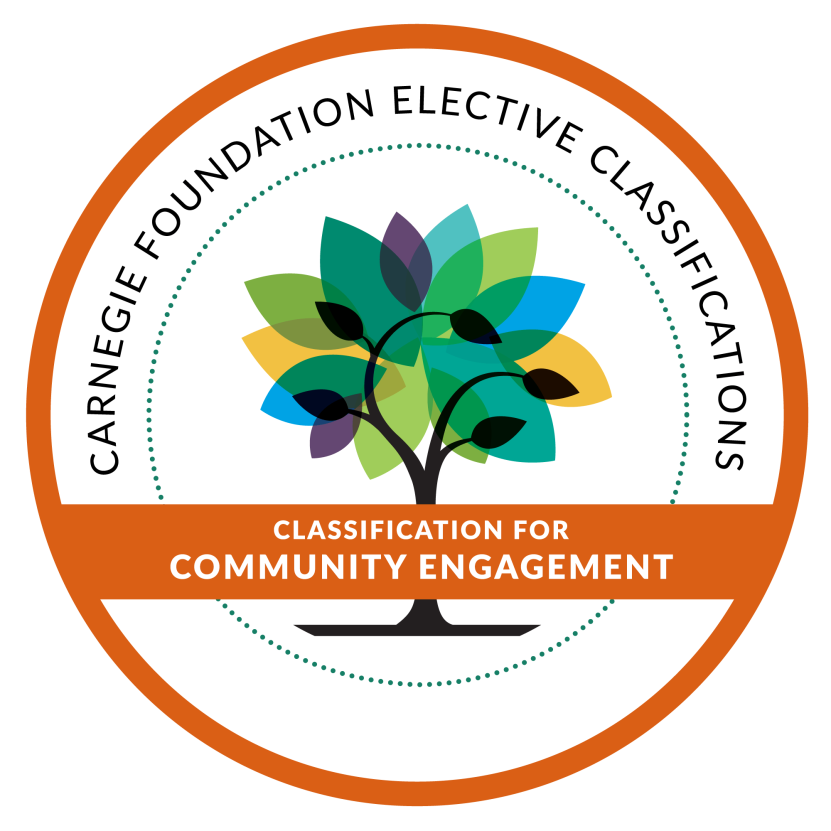 In January 2026, UNM received a renewal of the Carnegie Classification for Community Engagement. The designation was first granted to UNM in 2020. The Carnegie Community Engagement Classification is an elective designation awarded by the American Council on Education (ACE) and the Carnegie Foundation for the Advancement of Teaching that highlights an institution’s commitment to community engagement.
In January 2026, UNM received a renewal of the Carnegie Classification for Community Engagement. The designation was first granted to UNM in 2020. The Carnegie Community Engagement Classification is an elective designation awarded by the American Council on Education (ACE) and the Carnegie Foundation for the Advancement of Teaching that highlights an institution’s commitment to community engagement.
One force behind the renewal is the UMM Office of Community Engagement, led by Architecture Professor Tim Castillo. Tim has served as the inaugural director since the office was founded in 2021. The Office of Community Engagement sees “Community Engagement as an essential aspect of higher education, in partnering with communities we can develop solutions that address the challenges facing society.” The office has led projects in collaboration with community groups such as the Bosque Ecosystem Monitoring Program and Native Unbound, has hosted Community Engagement Work Sessions, and piloted a Community Engagement Impact Map.
For more on this award and Tim’s leadership in the Office of Community Engagement, see this UNM Newsroom article.
Jennifer L. Tucker publishes a chapter “Abolitionist University” in Insurgent Ground: Land, Housing, Property
Jennifer L. Tucker joined an international group of scholars and activists at a Freedom School organized by the Institute for Inequality and Democracy at UCLA. The group authored an edited collection, Insurgent Ground: Land, Housing, Property. With three co-authors, Tucker published the chapter “The Abolitionist University.” The chapter shows how universities are structured by policing, punishment, securitization, and war economies. Against this, the chapter encourages work toward the abolitionist university, that is, formal sites of learning that organize praxis for liberation. Praxis is the interrelationship of practice and theory. The chapter offers nine propositions for the abolitionist university that encourage 1) the speculative abolitionist university, 2) new articulations of land, labor, capital and state capacity, 3) true community safety and police-free campuses, 4) open and tuition-free education, 5) divesting from economies of harm, 6) transformative pedagogies, 7) deep publics, 8) moving from Land Grant to Land Back universities, and 9) liberating labor for life-work.
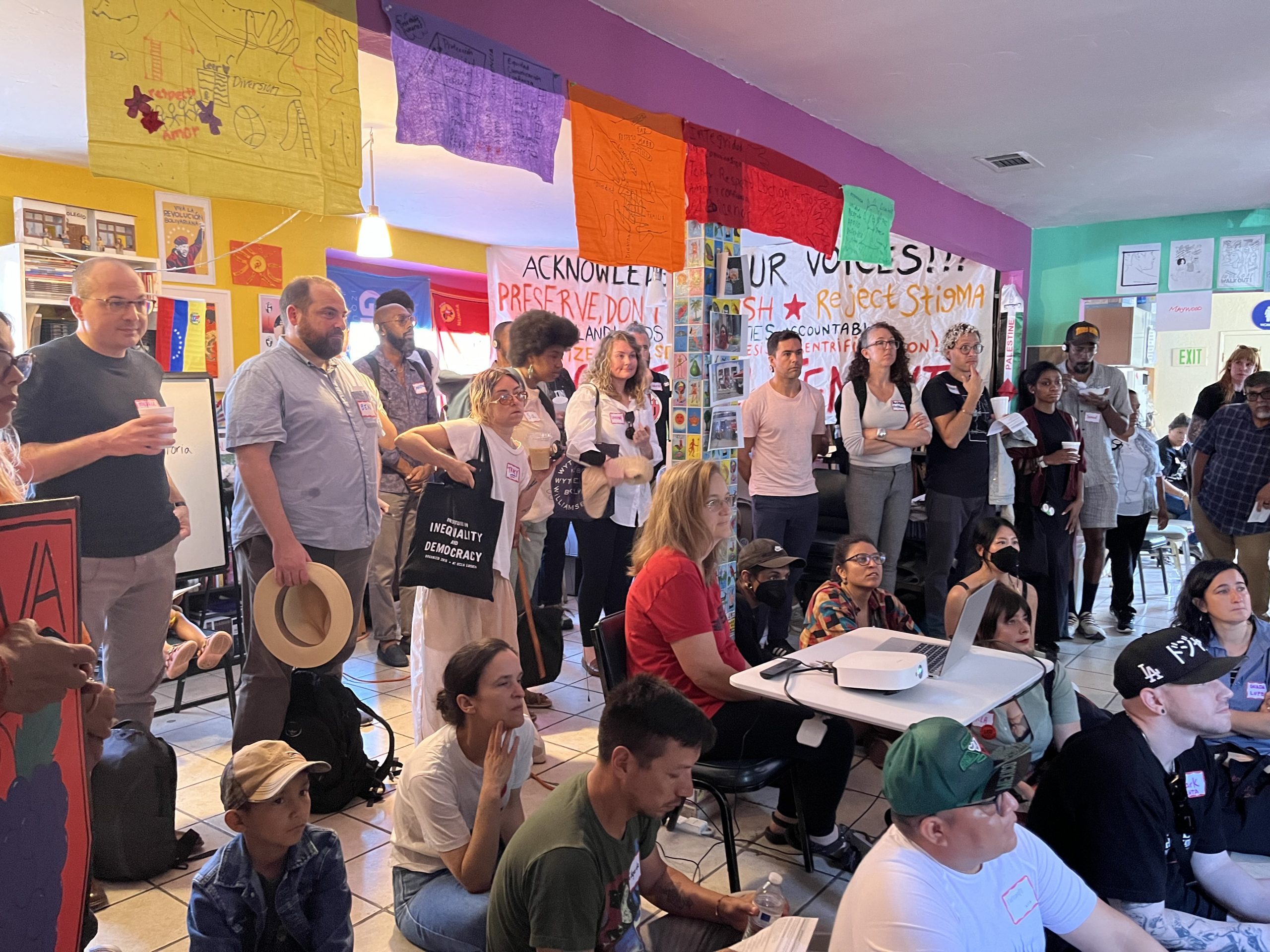
2025 “The Abolitionist University,” in Insurgent Ground: Land, Housing, Property, UCLA Luskin Institute on Inequality and Democracy, 109–119, with Davarian Baldwin, Hamid Khan and David Kelly (eds.) available online.
Find a link to the article here, the book Insurgent Ground here, and the chapter “The Abolitionist University” here.
Jennifer L. Tucker is a scholar of racial capitalism, urban inequality and struggles for social justice. Her research explores how places and practices construed as informal, illegal or lawless buttress networks of elite power and produce different kinds of urban spaces ( Faculty Profile).
Image Credit: Michele Lancione. Freedom School participants learn about housing justice at the LA Poverty Department, an arts organization.
Stephanie Bunt publishes article on student learning through precedents
Assistant Professor of Architecture, Stephanie Bunt, published the article “Go big or stay home? Structural understanding through the accessibility of precedent,” in Building Technology Educator's Society. This work contributed the understanding of how to better assess student learning in architectural structures courses. Through a project assigned in an architectural structures class that required the students to build a structurally functional model of an existing building, the affordances of precedents in teaching structures are considered and the level of student understanding is reported.
Bunt, S., (2025) “Go Big or Stay Home? Structural Understanding Through the Accessibility of Precedent”, Building Technology Educators’ Society 2025(1). doi: https://doi.org/10.7275/btes.3491
Stephanie Bunt’s research and reaching focuses on characterizing, evaluating, and improving the multi-disciplinary design education of architects and engineers ( Faculty Profile)
Stephanie Bunt publishes article on pedagogical approaches to structural engineering
With co-author Dr. Anjali Mulchandani from UNM's CCEE department, Stephanie Bunt (Assistant Professor, Architecture) published the article “Pedagogical bridges: evaluation of structural education and syllabi for engineers and architects over time,” in American Society of Engineering Education.
Classes that teach building structures in engineering and architecture are often separated into distinct curriculum; however, the rules that govern structural behavior remain the same. While there are advantages to developing courses that meet the learning outcomes of specific disciplines, engineers and architects work together towards the same final product: a building. This work assess differences and developments in architecture and engineering-based structures classes in selected universities over the last 50 years.
Bunt, S., & Mulchandani, A. (2025, June), BOARD # 53: Pedagogical Bridges: Evaluation of Structural Education and Syllabi for Engineers and Architects Over Time Paper presented at 2025 ASEE Annual Conference & Exposition , Montreal, Quebec, Canada. https://doi.org/10.18260/1-2--55867
Stephanie Bunt’s research and reaching focuses on characterizing, evaluating, and improving the multi-disciplinary design education of architects and engineers ( Faculty Profile)
SA+P faculty member Lauren McQuistion awarded OER publication grant from UNM Library
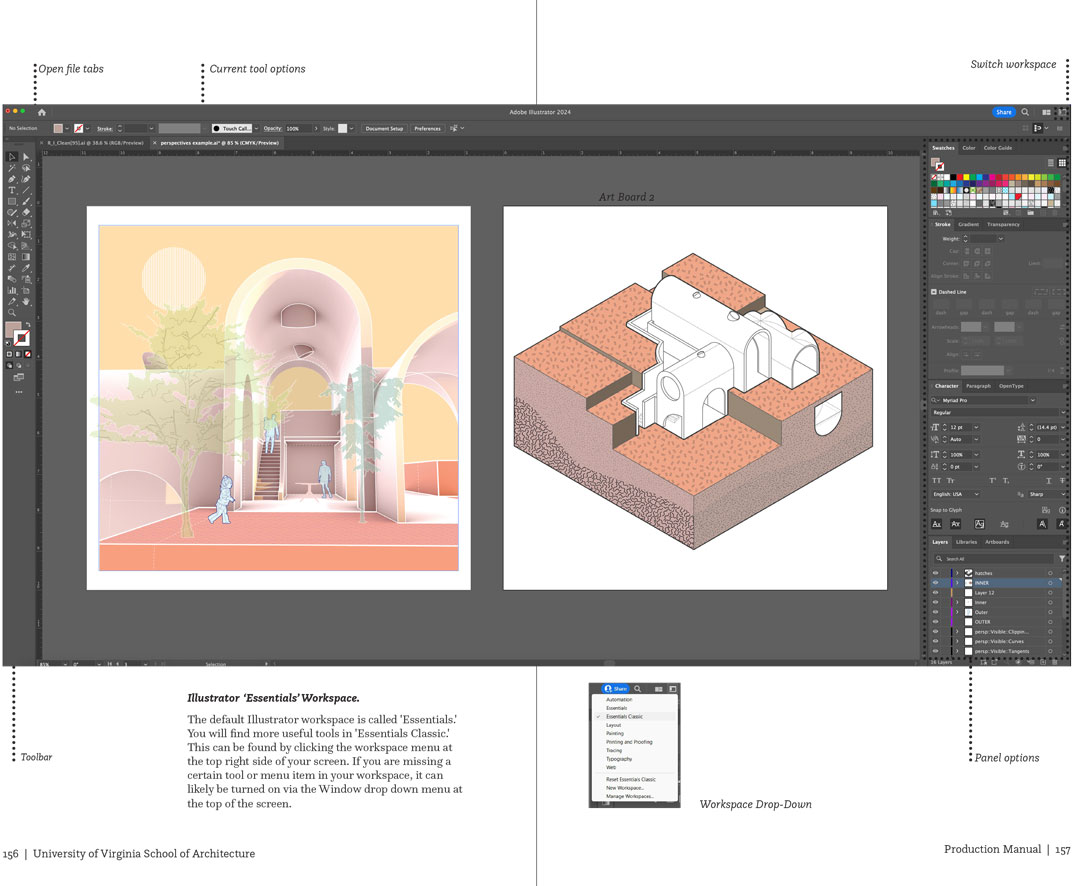
Lauren McQuistion, Assistant Professor of Architecture, has been awarded a grant from the UNM Library to support the development and adoption of an Open Educational Resource (OER) studio companion textbook for the foundational design courses in the School of Architecture and Planning.
Building on the Production Manual, an OER she co-authored and piloted at the University of Virginia, the project adapts and expands this resource for UNM’s design foundations sequence, consolidating essential analog and digital skills such as drawing, modeling, and image editing into a single accessible text. This work is significant for its potential to reduce student costs, strengthen retention, and support learning outcomes across multiple courses. The grant of more than $8,000 will support student researchers contributing to the project, advancing a collaborative and inclusive model of design education at UNM.
More about the UNM Library's OER Initiative can be found here: https://oer.unm.edu/ and access to the state of New Mexico's Open Educational Resource (NMOER) Consortium here: https://nmoer.org/
Lauren’s research examines the spatial history of museum institutions and their entanglement with cultural identity formation through the visual and spatial regimes of art and architecture in the 20th and 21st centuries (faculty bio).
SA+P Celebrates the Design Planning and Assistance Cetner (DPAC) and DPAC director Michaele Pride
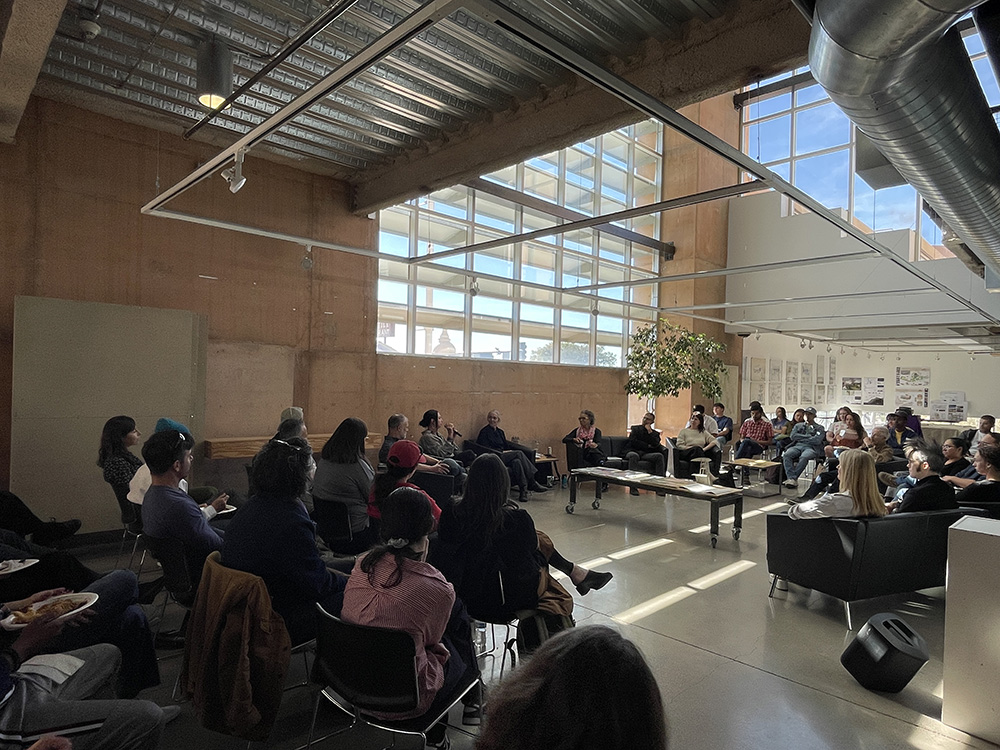 On November 5th, the School of Architecture and Planning hosted a Golden Professional Alumni lunch in honor of DPAC Director and Professor of Architecture, Michaele Pride. Michaele was joined by alumni of the Design Planning and Assistance Center (DPAC) to celebrate the program’s 56-year history and its recent successes under Michaele’s visionary leadership.
On November 5th, the School of Architecture and Planning hosted a Golden Professional Alumni lunch in honor of DPAC Director and Professor of Architecture, Michaele Pride. Michaele was joined by alumni of the Design Planning and Assistance Center (DPAC) to celebrate the program’s 56-year history and its recent successes under Michaele’s visionary leadership.
Founded in 1969, DPAC is one of the oldest continually operating design assistance centers in the country. DPAC was formed during a community design movement that linked university design programs and design practitioners with communities in need—and it continues that mission through community-engaged learning and scholarship.
At the luncheon, DPAC alumnae Christie Green and Jessica Cassyle Carr reflected on how their experiences as students DPAC studios has shaped their current professional ambitions. Christie talked about the liberating experience of DPAC studios, which helped her to cultivate an imaginative process that she continues to balance with the deliverables of design commissions; Jessica discussed how community-based participatory research informs her current interests in public health communication. The panel also included several faculty members who have worked with DPAC as former students or collaborators—Francisco Uvina-Contreras, Tony Fettes, Katya Crawford, and Catherine Harris—who described the Main Street studios, in which student were involved in all aspects of the design process, including the presentation of their work to community members.
Michaele also covered DPAC’s evolution in recent years, including the Choice Neighborhoods Project with the United South Broadway (2024), the Hermit’s Peak and Calf Canyon Fire Recovery and Resilience Plan (2023), and the Santa Fe Midtown Community Engagement Project (2020-2022). Michaele proudly reflected on the successes (and challenges) of the Santa Fe Midtown Project, which took place during COVID and was one of the most radical experiments of community-ownership of the design process, in which DPAC helped to organize engagement sessions, surveys, and interviews to promote equitable representation throughout the redevelopment initiative.
With Michaele concluding her tenure as DPAC director next year, SA+P celebrates her leadership and looks ahead to promising things to come for DPAC as the program builds on her legacy moving forward.
Catherine Page Harris and Michaele Lea Pride to publish a book chapter on post-disaster design
Catherine Page Harris (Associate Professor and Chair, Landscape Architecture) and Michaele Lea Pride (Professor of Architecture & Director of the Design and Planning Assistance Center) will publish the chapter “Second Responders: Post-disasters design studio” in Activism in Design Education, edited by Claire Latane and Jean Yang, with Routledge in 2026.
This chapter described the tools the Design and Planning Assistance Center has developed in working with post-disaster spaces in New Mexico to engage with community while helping students develop empathy, collaboration skills, and systems thinking. The Toolkit is 1. Direct Engagement with people, places, and ideas, 2. volunteering in the community, 3 Worldview exercises, 4. Respect and compensation for time and expertise, and 5. Design as synthesis and dialogue. This work contributes to scholarship about design assistance centers in academic settings and to community engaged scholarship, highlighting the place-based and cultural resilience of New Mexico.
Second Responders: Post-disasters design studio (book chapter) in Activism in Design Education, edited by Claire Latane and Jean Yang, to be published by Routledge in 2026.
Catherine Page Harris’s current research includes listening to indigenous landscape, developing 3D imaging of botanical resilience, and proposing urban posthuman places ( Faculty Profile).
Michaele Pride’s current work focuses on the intersection between design and public health—seeking ways to create healthy, sustainable and equitable communities ( Faculty Profile).
Tim B. Castillo Presents on Community-Engaged Research at Two National Conferences
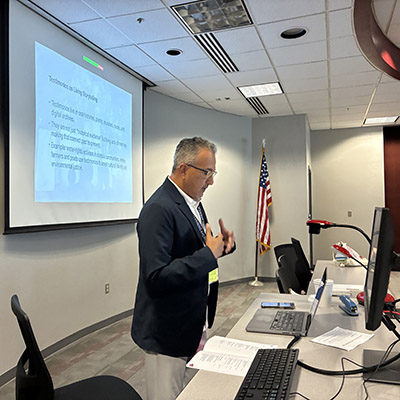 Professor Tim B. Castillo, of the University of New Mexico, presented his scholarship and leadership in community-engaged research at two distinguished national conferences in 2025: the Imagining America National Gathering and the Engagement Scholarship Consortium International Conference.
Professor Tim B. Castillo, of the University of New Mexico, presented his scholarship and leadership in community-engaged research at two distinguished national conferences in 2025: the Imagining America National Gathering and the Engagement Scholarship Consortium International Conference.
At the Imagining America National Gathering, held in Las Cruces, New Mexico, Professor Castillo delivered a presentation on the evolving work of UNM’s Office of Community Engagement, focusing on the development of a university-wide repository and resource collection that highlights community-engaged teaching, research, and creative scholarship. His session emphasized the principles of reciprocity, mutuality, and listening as critical components of authentic engagement. Through an interactive and participatory format, attendees were invited to contribute reflections on collective memory, place, and shared responsibility within the broader framework of public scholarship.
At the Engagement Scholarship Consortium International Conference, themed “Bridging Resources to Build Stronger Communities,” Professor Castillo presented on UNM’s institutional strategies for fostering collaboration between academic research and civic practice. His presentation underscored the role of design, architecture, and cultural stewardship in advancing the mission of higher education through meaningful community partnerships. In both forums, Professor Castillo articulated a vision of community engagement grounded in equity, creativity, and long-term collaboration, reflecting the University of New Mexico’s ongoing commitment to serving the diverse communities of the Southwest and beyond.
Tim B. Castillo is the Director of Community Engagement Initiatives at UNM and a Professor of Architecture. In his research and teaching, Professor Castillo pursues new pedagogies that explore applications related to emerging digital technologies and innovation (Faculty Profile).
Ashley Lazevnick receives Research Staff Award
 Faculty Research Support Officer, Ashley Lazevnick, is the recipient of the Outstanding New Research Staff Member Award, issued by the Office of the Vice President for Research. The award recognizes that the expertise, dedication, and professionalism of UNM’s diverse research support staff contributes essentially to the success of UNM’s research mission. Ashley works with faculty in the School of Architecture and Planning as well as the College of Fine Arts. She came to UNM in July 2024, after several years of teaching in higher education.
Faculty Research Support Officer, Ashley Lazevnick, is the recipient of the Outstanding New Research Staff Member Award, issued by the Office of the Vice President for Research. The award recognizes that the expertise, dedication, and professionalism of UNM’s diverse research support staff contributes essentially to the success of UNM’s research mission. Ashley works with faculty in the School of Architecture and Planning as well as the College of Fine Arts. She came to UNM in July 2024, after several years of teaching in higher education.
For more on the award, visit the UNM newsroom.
Viva Vegas Conference features SA+P Professors and Students
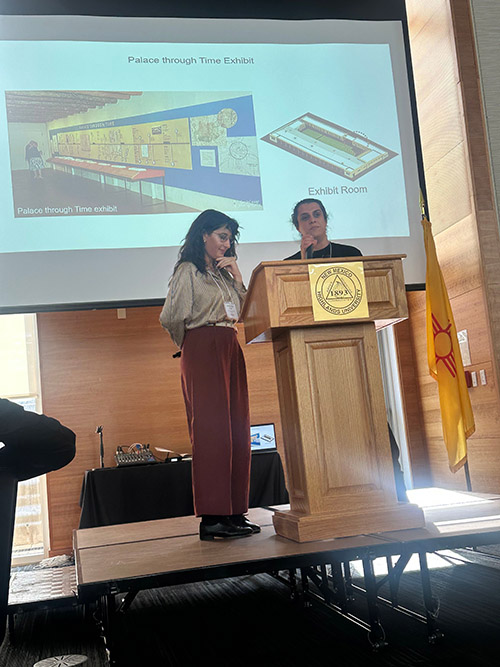 The School of Architecture and Planning was well represented at the New Mexico Historic Preservation “Viva Vegas” Conference, October 2-5 2025, at New Mexico Highlands University in Las Vegas, NM.
The School of Architecture and Planning was well represented at the New Mexico Historic Preservation “Viva Vegas” Conference, October 2-5 2025, at New Mexico Highlands University in Las Vegas, NM.
Ted Jojola, emeritus Director of the Indigenous Design and Planning Institute and emeritus Professor of Community and Regional Planning, gave a keynote lecture, “PlaceKnowing and 7 Generations Planning,” in which he outlined the principles used for indigenous planning that focuses on cultural identity, worldview, and generational thinking to create sustainable communities. Emeritus professor of Landscape Architecture, Chris Wilson, was another keynote speaker. His talk, “Preservation, Urbanism, and the Housing Crisis,” explored the legacy of the preservationist movement and the history of mixed-use and multi-family housing in the U.S., and advocated for the revival of historic housing types and denser, walkable communities to help address our current housing crisis.
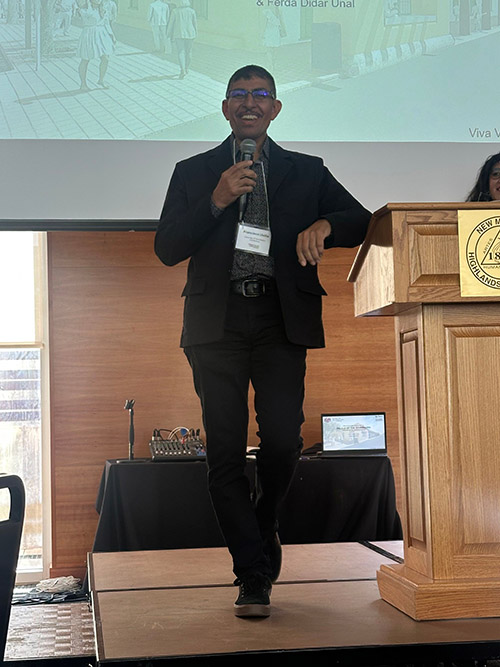 Graduate students Omid Shafigh Khatibi and Ferda Didar Ünal presented their research on the Palace of the Governers (Santa Fe) in the presentation: “Architectural Evolution of the Palace of the Governors through Digital Representation.” Under the supervision of Francisco Uviña-Contreras, Assistant Professor of Architecture, Omid and Didar created 3D-printed physical models and architectural drawings for the “Palace through Time” exhibit, displayed in the New Mexico History Museum, which displays the archaeological, historical, and architectural evolution of the Palace of the Governors (POG) over the centuries and under different administrations in eight different milestones in the region’s history.
Graduate students Omid Shafigh Khatibi and Ferda Didar Ünal presented their research on the Palace of the Governers (Santa Fe) in the presentation: “Architectural Evolution of the Palace of the Governors through Digital Representation.” Under the supervision of Francisco Uviña-Contreras, Assistant Professor of Architecture, Omid and Didar created 3D-printed physical models and architectural drawings for the “Palace through Time” exhibit, displayed in the New Mexico History Museum, which displays the archaeological, historical, and architectural evolution of the Palace of the Governors (POG) over the centuries and under different administrations in eight different milestones in the region’s history.
Professor Uviña-Contreras gave another presentation: “Re-adapting Historic Projects through Student Participatory Community Engagement,” in which he discussed the course Preservation Technologies and Adaptive Reuse in the Historic Preservation and Regionalism (HP+R) Program at UNM. This course is dedicated to introducing students to national and international standards, theory, pathologies, and documentation for historic preservation, and, importantly, the application of these lessons to real-world experience within community-engaged projects.
To see a record of the conference and explore the abstracts, visit the NM Historic Preservation website.
Stathis Yeros publishes Mississippi Violet on Platform
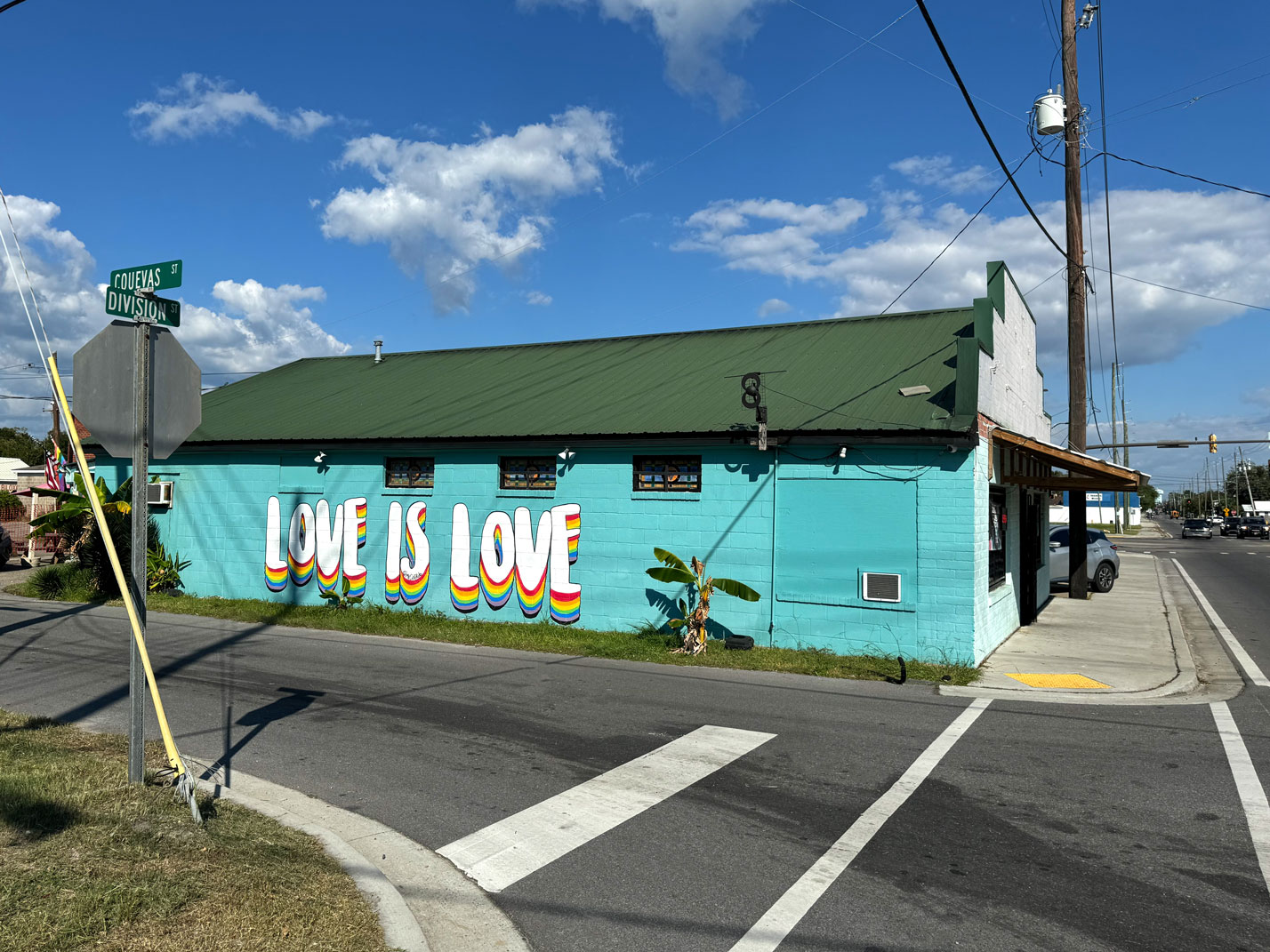 In September 2025, Stathis G. Yeros (Assistant Professor, Architecture) published Mississippi Violet on Platform: A digital forum for conversations about buildings, spaces, and landscapes. The essay explores LGBTQ+ spaces and queer resilience in the Deep South, drawing on Yeros’s recent research travels. It previews themes he is expanding in his next book on queer placemaking and democracy in the South.
In September 2025, Stathis G. Yeros (Assistant Professor, Architecture) published Mississippi Violet on Platform: A digital forum for conversations about buildings, spaces, and landscapes. The essay explores LGBTQ+ spaces and queer resilience in the Deep South, drawing on Yeros’s recent research travels. It previews themes he is expanding in his next book on queer placemaking and democracy in the South.
Stathis Yeros is a historian of the built environment and designer whose research explores how struggles for social justice shape, and are shaped by, the spaces we inhabit. He is the author of Queering Urbanism: Insurgent Spaces in the Fight for Justice (University of California Press, 2024). ( Faculty Profile.)
iDPi Director Ted Jojola co-curates exhibition for the Indian Pueblo Cultural Center
 Dr. Ted Jojola, Director of the Indigenous Design and Planning Institute and Professor Emeritus, partnered with Dr. Lynn Paxson to curate the exhibition Restorying Our HeartPlaces: Contemporary Pueblo Architecture Exhibition at the Indian Pueblo Cultural Center in Albuquerque. Restorying Our HeartPlaces is about more than just buildings—it is about honoring Indigenous sovereignty and ensuring that Pueblo design continues to flourish. “Rather than an exhibit of simply images of finished buildings as objects, we seek to go deeper, telling the stories of the places and how and why they came to be and their use in Pueblo communities. This exhibit seeks to increase the awareness of Indigenous design, highlighting Pueblo practitioners so that people can see the high quality of their design work and its relationship to ancestral practices. It is important for upcoming young Indigenous people to see this work as necessary for exercising the sovereignty of their communities.” Restorying Our HeartPlaces opened March 25, 2025 and will close December 7, 2025.
Dr. Ted Jojola, Director of the Indigenous Design and Planning Institute and Professor Emeritus, partnered with Dr. Lynn Paxson to curate the exhibition Restorying Our HeartPlaces: Contemporary Pueblo Architecture Exhibition at the Indian Pueblo Cultural Center in Albuquerque. Restorying Our HeartPlaces is about more than just buildings—it is about honoring Indigenous sovereignty and ensuring that Pueblo design continues to flourish. “Rather than an exhibit of simply images of finished buildings as objects, we seek to go deeper, telling the stories of the places and how and why they came to be and their use in Pueblo communities. This exhibit seeks to increase the awareness of Indigenous design, highlighting Pueblo practitioners so that people can see the high quality of their design work and its relationship to ancestral practices. It is important for upcoming young Indigenous people to see this work as necessary for exercising the sovereignty of their communities.” Restorying Our HeartPlaces opened March 25, 2025 and will close December 7, 2025.
Dr. Jojola has a distinguished career as an educator and practitioner in urban and regional planning and other related subjects, with particular specialty in indigenous planning (Faculty Profile)
For more about the exhibition, visit the Indian Pueblo Cultural Center website, and see the profile in the Green Fire Times (beginning on p.14)
Caroline Scruggs co-authors an article on water reuse in Environmental Research
Professor Caroline Scruggs (Community and Regional Planning) has co-authored the article “Exploring state-level messaging toward US water reuse: a media analysis across time and space,” in the August 2025 issue of Environmental Research: Infrastructure and Sustainability. Lack of institutional acceptance can be a key barrier to water reuse. This study used media analysis, including topic modeling and sentiment analysis of state and city news and government documents, to examine evolving state-level institutional attitudes toward water reuse. It also identified patterns in media coverage that reflected shifts in institutional attitudes. Increased state-level media coverage predicted eventual government implementation of water reuse and showed evidence of policy diffusion across states.
Professor Scruggs’ research and teaching focus on mixed method investigations of environmental problems, examining local issues that have global significance and conducting research that can inform policies around ecosystem and public health (Faculty Profile).
“Exploring state-level messaging toward US water reuse: a media analysis across time and space,” Environmental Research: Infrastructure and Sustainability, (2025) DOI: 10.1088/2634-4505/adf664
Nora Wendl publishes Almost Nothing: Reclaiming Edith Farnsworth
In May 2025, Associate Professor of Architecture Nora Wendl published Almost Nothing: Reclaiming Edith Farnsworth with The University of Illinois Press. Shortlisted for the Graywolf Press Nonfiction Prize and praised as “lyrical, propulsive, and incredibly clear,” Almost Nothing examines the role of Edith Farnsworth in the creation of Mies van der Rohe’s iconic glass home. 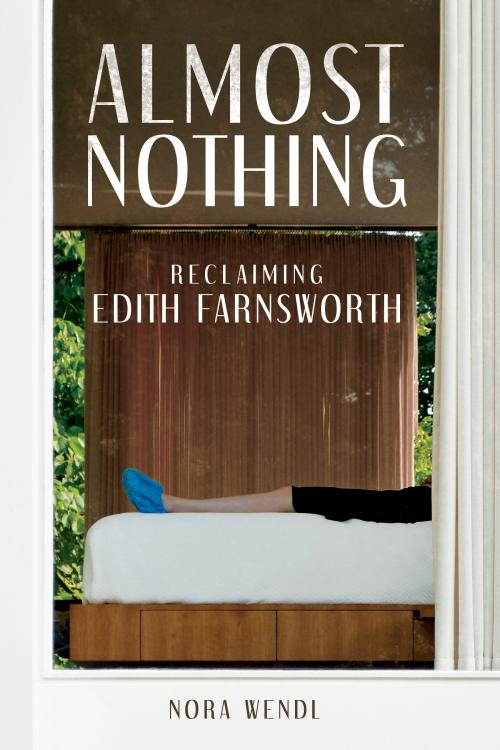
From the Press: “Nora Wendl’s audacious work of creative nonfiction explodes the sex-and-real-estate myth surrounding the Edith Farnsworth House and its two central figures. An eminent physician and woman of letters, Farnsworth left a rich trove of correspondence, memoirs, and photographs that Wendl uses to reconstruct her voice. Farnsworth’s memories and experiences alternate with Wendl’s thoughts on topics like misogyny and professional ambition to fashion a lyrical examination of love, loneliness, beauty, and the search for the divine.”
Wendl’s research and teaching subverts the received narratives that underpin architecture historiography by engaging feminist practices to create essays, books, installations, photographs, and films that offer new forms and frameworks for historicizing the built and unbuilt environment ( Faculty Profile).
Visit the University Illinois Press page for more.
Katya Crawford and Kathleen Kambic published The Design Competition in Landscape Architecture
The Design Competition in Landscape Architecture by Katya Crawford (Professor and Department Chair, Landscape Architecture) and Kathleen Kambic (Associate Professor, Landscape Architecture) was published with the University of New Mexico Press in September 2025. Blending history, interviews, and case studies, The Design Competition is the first book to investigate the role of competitions in shaping the discipline of landscape architecture. 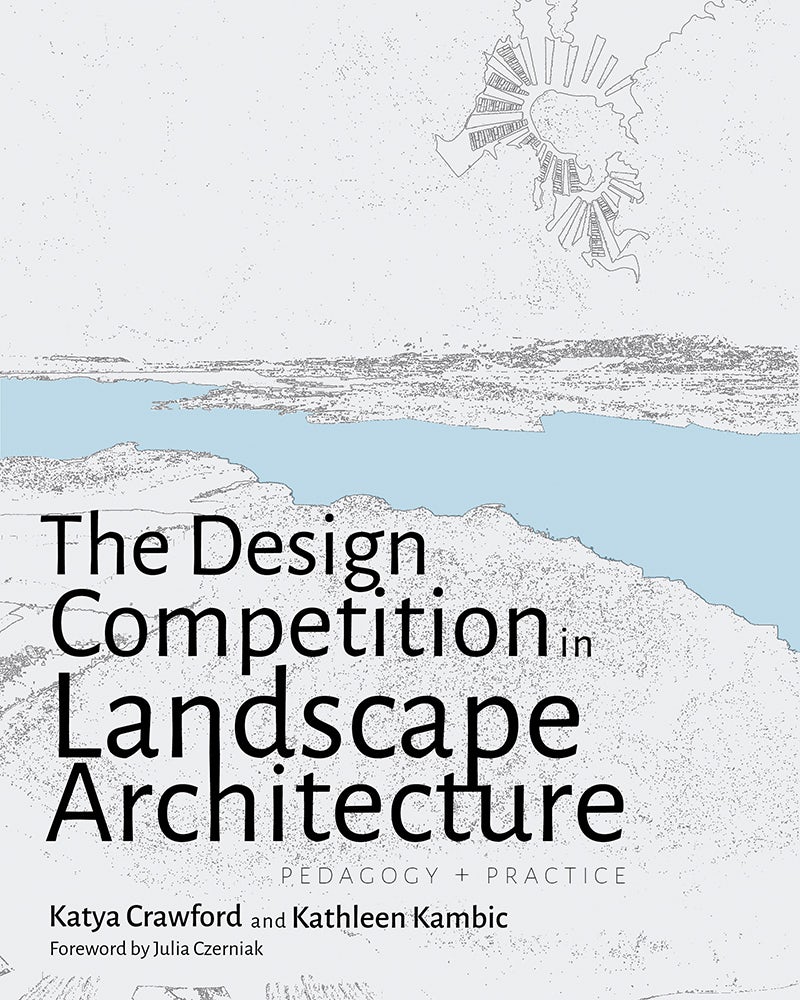
From the Press: “Divided into five sections, the book provides an overview of the history and development of modern design competitions, includes interviews with world-renowned landscape architects and designers, offers a pedagogical approach to competition studios as part of a college curriculum, showcases award-winning designs from landscape architecture faculty and students (including built projects), and reflects on future directions for landscape architecture design competitions.”
Review: “This book offers a road map to the design competition, a source of avant-garde thinking and making that has broad implications for the future of landscape architecture and the built environment. Showing us how design competitions have generated inspired approaches to reshaping cities, the authors lay the foundations for a hopeful practice of design with the power to transform our contemporary world.” --Phoebe Lickwar, PLA, FAAR Founding Principal | Forge Landscape Architecture
Katya’s research focuses on the ephemeral landscape and its power to engage and reveal social and environmental systems (Faculty Profile). Kathleen’s research interests include water infrastructure, marginalized urban space, feminist political ecology, and landscape design theory; she is also an affiliate with the Water Resource Program, the department of Geography and Environmental Studies, and the Women, gender & Sexuality Studies Program at UNM (Faculty Profile). Together with Ane Gonzalez Lara, Katya and Kathleen were awarded third place in the 2016 Hornachuelos International Design Competition and first place in the 2017 What’s Up Paris International Design Competition (both hosted by ReThinking Competitions).
Visit the UNM Press page for more.
Baker H. Morrow publishes The Horse on the Sidewalk
Baker H. Morrow, Professor of Practice in Landscape Architecture, has published The Horse on the Sidewalk with Casa Urraca Press in Abiquiú. Set in post-war Albuquerque and centered on the life of Gil Wheeler, The Horse on the Sidewalk has been celebrated as a series of stories that will “delight the reader with their minimalist precision, their eccentric humor, and the off-the-wall details of their no-bull realism.” 
From the Press: “Together, Gil and his friends navigate their just-built junior high and the desert landscape beyond their neighborhood—a new suburb that, much like their young lives, is brimming with both fresh possibility and the promise that not all dreams will come true.”
A professional landscape architect and founder of the firm Morrow Reardon Wilkinson Miller, Baker Morrow has been teaching at UNM since 1975. Morrow is author of eleven other books, including Best Plants for New Mexico Gardens and Landscapes (1995, revised edition, 2016) and Canyon Gardens: The Ancient Pueblo Landscapes of the American Southwest (with V.B. Price, 2008) ( Faculty Page)
Visit the Casa Urraca Press page for more.
Liane Hancock co-authors article on Consensus Tables for Case Western Reserve Law Review
With co-author Jorge L. Contreras (University of Utah), Liane Hancock, Assistant Professor of Architecture, published an article “Consensus Tables” in the May 2025 issue of Case Western Reserve Law Review. The authors explore the development and use of consensus tables, or standardized contractual terms used by multiple parties operating within a single market segment, across different industries, and they outline criteria for developing successful consensus tables.
Liane Hancock’s scholarship and teaching explore building materials and construction methods; she is co-author of The Green Building Materials Manual - A Reference to Environmentally Sustainable Initiatives and Evaluation Methods (2021) and author of Perfect Concrete (2026) ( Faculty Profile).
Contreras, Jorge L., and Liane Hancock. "Consensus Templates." Case Western Reserve Law Review (2025).
Stephanie Bunt publishes in the Journal of Engineering Design
In April 2025, Stephanie Bunt (Assistant Professor of Architecture) published “Comparing optimisation strategies of building design students and expert practitioners across subtasks” in the Journal of Engineering Design. Optimization strategies are useful for designing high performing buildings. However, little is known about how designers of different levels of experience approach optimization strategies. This paper compares strategies and design behaviors, which is helpful for informing better ways to educate students on the use of optimization tools.
Stephanie Bunt’s research focuses on characterizing, evaluating, and improving the multi-disciplinary design education of architects and engineers, particularly through their design strategies and digital tools. ( Faculty Profile)
Bunt, S., Berdanier, C. G., Menold, J., & Brown, N. C. (2025). Comparing optimisation strategies of building design students and expert practitioners across subtasks. Journal of Engineering Design, 1-27. doi: 10.1080/09544828.2025.2489648
Caroline Scruggs co-authors an article on agriculture and water security in the journal Agriculture
With five other UNM colleagues, Caroline Scruggs published “Perspectives on Innovative Approaches in Agriculture to Managing Water Security in the Middle Rio Grande Basin” in the April 2025 issue of the journal Agriculture. Drawing on interviews with stakeholders in the use and allocation of water in the Middle Rio Grande basin, the authors examined the incentives and the barriers to adopting innovative actions to managing water scarcity.
Professor Scruggs’ research and teaching focus on mixed method investigations of environmental problems, examining local issues that have global significance and conducting research that can inform policies around ecosystem and public health ( Faculty Profile).
Hasenbeck, Eleanor C., Caroline E. Scruggs, Melinda Morgan, Jingjing Wang, Alex J. Webster, and Corina M. Gomez. "Perspectives on Innovative Approaches in Agriculture to Managing Water Scarcity in the Middle Rio Grande Basin." Agriculture 15, no. 7 (2025): 793.
Eric Griego Montoya publishes in the International Journal of Social Sustainability in Economic, Social, and Cultural Context
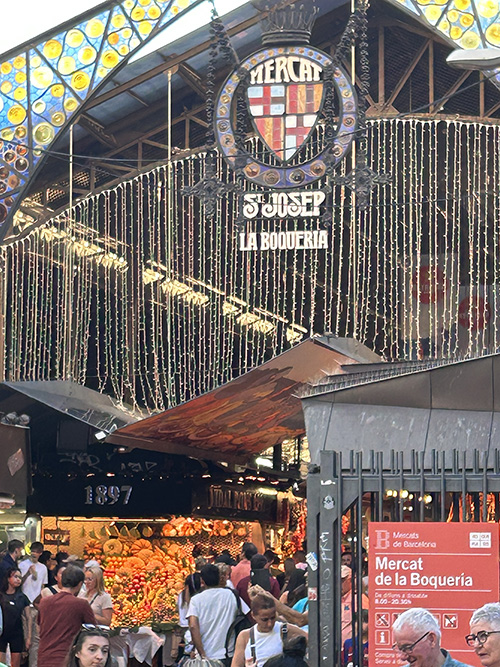 Dr. Eric Griego Montoya, lecturer in Community and Regional Planning, published the article “Institutional and Policy Resilience in the Face of Local Electoral Changes – the Case of the Social and Solidarity Economy in Barcelona” in the March 2025 issue of International Journal of Social Sustainability in Economic, Social, and Cultural Context.
Dr. Eric Griego Montoya, lecturer in Community and Regional Planning, published the article “Institutional and Policy Resilience in the Face of Local Electoral Changes – the Case of the Social and Solidarity Economy in Barcelona” in the March 2025 issue of International Journal of Social Sustainability in Economic, Social, and Cultural Context.
The article explores the connection between more community-driven and inclusive economic development policy such as that embodied in the social and solidarity economy (SSE) and the resilience of these economic democracy policies based on local electoral politics. The Barcelona case study focuses on the interplay between local electoral politics and institutions created to advance the more democratic local economic development strategies and is instructive for similar efforts in American cities and across the globe.
Dr. Griego Montoya’s teaching and research focus on economic development politics, social capital, and public policy (Faculty profile).
The International Journal of Social Sustainability in Economic, Social, and Cultural Context. 2025.The International Journal of Social Sustainability in Economic, Social, and Cultural Context ISSN: 2325-1115 (Print), ISSN: 2325-114X (Online) Volume 21, Issue 2, https://doi.org/10.18848/2325-1115/CGP/v21i02/1-20
Renia Ehrenfeucht publishes an article on incoherent convergent science in Ecology and Society
In March 2025, Renia Ehrenfeucht (Professor of Community and Regional Planning and SA+P Associate Dean of Research) co-authored the article “Towards an incoherent convergence science: diverse economies, crises, and recoveries, and the hope for better futures” in a special feature on Convergent Science for Sustainable Regional Systems for the journal Ecology and Society. With colleagues in Geography and Enviornmental Studies, Ehrenfeucht uses the recovery from the 2022 Hermits Peak Calf Canyon wildfires in Mora, NM to argue for a “incoherent convergence” approach to crises and disaster response, one that requires researchers to come together with other knowledge bearers and allows for epistemological plurality without assuming a singular understanding or shared worldview.
Professor Ehrenfeucht’s research and teaching is motivated by the belief that committed social action can dismantle colonialism and racism and create ways of living that respect diverse people and all species. Her research explores how people reshape built environments, especially by focusing on public spaces and the politics of everyday life, and how people, places and institutions respond to population loss ( Faculty Profile)
Montoya, Manuel R., Ehrenfeucht, Renia, Walsh-Dilley, Marygold, Warner, Ben P., & Tawse-Garcia, Cassidy A. (2025). Towards an incoherent convergence science: diverse economies, crises, and recoveries, and the hope for better futures. Ecology and Society, 30(1). https://doi.org/10.5751/ES-15810-300130
Caroline Scruggs co-authors two articles for Ecology and Society
In March 2025, Professor Caroline Scruggs (Community and Regional Planning) co-authored two articles in Ecology and Society. Written by an interdisciplinary group of UNM professors involved in research on the Santa Fe Watershed, many of whom are affiliated with the ARID institute, the articles focus on the possibilities and frictions of convergent research.
In "Facilitating convergence research on water resource management with a collaborative, adaptive, and multi-scale systems thinking framework,” Scruggs and her co-authors, including CRP Assistant Professor Lani Tsinnajinnie, analyze the use of Collaborative, Adaptive, and Multi-Scale (CAMS) systems thinking in their research team’s study of watersheds as a complex system. In "Fuzzy SETS: acknowledging multiple membership of elements within social-ecological-technological systems (SETS) theory," Scruggs and co-authors recognize the frictions of working within an interdisciplinary team, especially the “potentially messy, multi-membership calcification of elements” within social, ecological, and technological categories, and propose the use of “Fuzzy SETS conceptual framework” to recognize the epistemological diversity of convergent research and to probe deeper into the understanding of complex systems.
See Caroline Scruggs’ faculty profile here.
Webster, Alex J., Yolanda C. Lin, Caroline E. Scruggs, Rebecca J. Bixby, Laura J. Crossey, Kun Huang, Atlin Johnson et al. "Facilitating convergence research on water resource management with a collaborative, adaptive, and multi-scale systems thinking framework." Ecology and Society 30, no. 1 (2025).
Lin, Yolanda C., Alex J. Webster, Caroline E. Scruggs, Rebecca J. Bixby, Daniel Cadol, Laura J. Crossey, Patria de Lancer Julnes et al. "Fuzzy SETS: acknowledging multiple membership of elements within social-ecological-technological systems (SETS) theory." Ecology and Society 30, no. 1 (2025).
Kristina Yu co-hosts Lunar Arts Award with the Space Sustainability Research Grand Challenges Team
The UNM ARTSLab hosted the Lunar Arts Award exhibition celebrating the creative exploration of the moon's influence on human culture and imagination on Friday, Jan. 24 from 4-6 p.m. at the UNM ARTSLab. Sponsored by the Space Sustainability Research Grand Challenge, NASA CASA Moon research program, and ARTSLab, this initiative supports innovative moon-related art projects by University of New Mexico students. From over 50 applications, five outstanding proposals were selected, each receiving a $750 artist stipend and $250 in material support to bring their visions to life.
Read more about the Lunar Arts Award
Kristina Yu, AIA, LEED GA, NCARB, is Professor of Architecture. Her research and teaching focus on the areas of design, architecture, and technology; her work with academia centralizes the beauty of architecture technical details, construction, delivery mechanism as collaborative and innovative processes ( Faculty Profile).
Caroline Scruggs publishes an overview of water reuse literature in Wiley Interdisciplinary Reviews: Water (WIREs Water)
Along with Miriam Hacker (The Water Center at Penn), Caroline Scruggs published “A Review of Social and Organizational Barriers to Water Reuse in the United States” in the January 2025 issue of Wiley Interdisciplinary Reviews: Water. Scruggs and Hacker provide an overview of the literature on water reuse, which is becoming an increasing necessity in municipal and regional water planning. They conclude that existing work focuses on economic considerations of water reuse and regulatory and policy impacts, but there is a need for more research on other factors of impacting the adoption of water reuse, such as workforce and capacity building and equity implication.
See Caroline Scruggs’ faculty profile here.
Scruggs, Caroline E., and Miriam E. Hacker. "A Review of Social and Organizational Barriers to Water Reuse in the United States." Wiley Interdisciplinary Reviews: Water 12, no. 1 (2025): e70009.
Francisco Uviña-Contreras co-authors an essay on the Embarrado Technique in the Journal of Traditional Building
In the November 2024 issue of the Journal of Traditional Building, Architecture and Urbanism, Francisco Uviña-Contreras published the article "La técnica vernácula del “embarrado” en San Pedro, Cuba" (“The Vernacular Embarrado Technique in San Pedro, Cuba”). With co-author Liysi Rojas Enrique, Uviña studied the embarrado earthen building technique that is used in several parts of Cuba. The authors reflect upon the continuity and revival of this technique in the community of San Pedro.
Francisco Uviña’s teaching and research focus on historic preservation, adaptive re-use design, and new design work utilizing traditional building methods ( Faculty Profile).
Contreras, Francisco Uviña, and Liyisi Rojas Enrique. "La técnica vernácula del “embarrado” en San Pedro, Cuba." Journal of Traditional Building, Architecture and Urbanism 5 (2024): 291-299.
Catherine Harris publishes a chapter in Transspecies Design
Associate Professor and Chair of Landscape Architecture, Catherine P. Harris, published the essay “The Problem is the Burning House” in the edited volume Transpecies Design: Design for a Posthumanist World published by Routledge in July 2024. Harris challenges the “condor thought experiment” (in which a person is asked to choose between saving a baby human and a baby condor from a burning house) by proposing that the problem is the burning house: the conditions that precipitate species extinction. Bringing critical theory into conversation with landscape design typologies, Harris reflects on the role of anthropomorphism in creative placemaking and art projects that sit at the junction of human and non-human space.
Catherine Page Harris’s current research includes listening to indigenous landscape, developing 3D imaging of botanical resilience, and proposing urban posthuman places ( Faculty Profile).
Harris, Catherine Page. "The Problem Is the Burning House." In Transpecies Design, pp. 127-135. Routledge, 2024.
Caroline Scruggs publishes an article on “There is No Poop Fairy Campaign” in the Journal of Planning Education and Research
With co-authors from UNM, the Albuquerque Metropolitan Arroyo Flood Control Authority, and Bernalillo County Natural Resource Services, Professor Caroline Scruggs (Community and Regional Planning) published the article “Voluntary Public Campaigns to Benefit the Environment: Assessing the Effectiveness of the There is No Poop Fairy Campaign” in the June 2024 issue of the Journal of Planning Education and Research. Scruggs and her co-authors analyzed the effectiveness of the Albuquerque-based campaign to encourage dog owners to pick up their dogs’ waste to prevent water contamination of the Rio Grande. The first paper of its kind to study such an intervention, the authors make suggestions about how to balance competing desires of community members and make a novel contribution to the literature on interventions for pro-environmental behavior.
See Caroline Scruggs’ faculty profile here.
Scruggs, Caroline E., Sergio Lozoya, Kellin N. Rumsey, Kali Bronson, and Patrick Chavez. "Voluntary Public Campaigns to Benefit the Environment: Assessing the Effectiveness of the There Is No Poop Fairy Campaign." Journal of Planning Education and Research 44, no. 2 (2024): 808-821.
Elspeth Iralu publishes two articles on Indigenous epistemologies
In 2024, Elspeth Iralu, Assistant Professor of Community and Regional Planning, published two articles that advocate for the use of storytelling and Indigenous epistemologies within scholarly practice: a research note “A Letter for Missing and Disappeared Archives” in the May issue of ACME: An International Journal for Critical Geographies and “Indigenous pedagogies of love: Theorizing nonscalable worlds” (co-authored with Dolly Kikon) in the October issue of Political Geography.
In “A Letter for Missing and Disappeared Archives,” Iralu weaves together personal reflections with historical events, contemplating a “history of the present.” From the abstract: “In this letter, Elspeth Iralu initiates a time-travelling correspondence with her paternal grandfather, Vichazelhu Iralu, about his dreams for the Naga sovereignty movement.” In “Indigenous pedagogies of love,” Iralu and Kikon use Naga storytelling as an alternative to metrics of development and explore forms of reciprocity and sociality that exists outside of the economic domain of expansion.
Iralu’s research focuses on Indigenous methodologies, Indigenous space, place, and mapping, as well as violence and visual culture ( Faculty Profile)
Iralu, Elspeth. ACME 23, no. 2 (2024): 161-165. DOI: https://doi.org/10.7202/1111255ar
Iralu, Elspeth, and Dolly Kikon. "Indigenous pedagogies of love: Theorizing nonscalable worlds." Political Geography 114 (2024): 103184. https://doi.org/10.1016/j.polgeo.2024.103184
Jennifer Tucker publishes an article on inclusive recycling in Development and Change
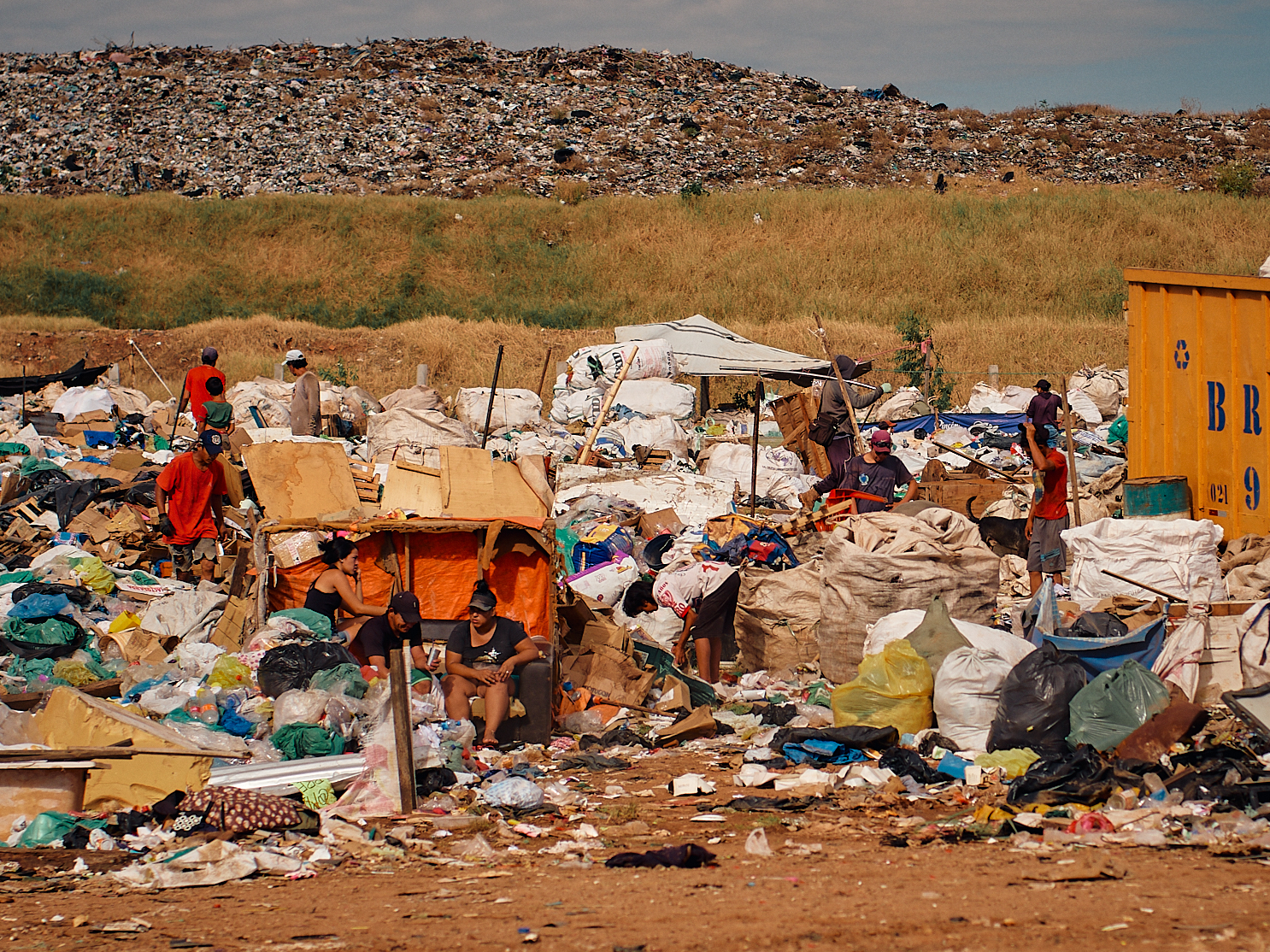
How can cities upgrade urban waste infrastructures while also supporting poor waste pickers who depend on informal recycling for their livelihoods? While development experts now agree that informal recyclers should be included in urban waste systems, many cities struggle to implement inclusive reforms. In a recent article, Jennifer L. Tucker identifies barriers to pro-poor reforms in Asuncion, Paraguay. Contrary to policy makers’ beliefs, the problem isn’t the culture or organizing styles of waste pickers. Instead, waste system reforms relied on a deficit framework that underappreciated the value produced by these workers, the diversity of their work processes, and the reasons why most opt to work individually, rather than in formalized cooperatives. A photo essay of this research produced by collaborators Nicolás Granada and Maximiliano Manzoni won the Paraguayan National Council of Science and Technology’s National Award for Scientific Communication and Dissemination.
MCRP student Alejandra Balbuena joined a team of Paraguayan researchers led by Jennifer to conduct the research behind this article.
Tucker, Jennifer L. "Barriers to Inclusive Recycling in Asunción, Paraguay: A Just Transition?." Development and Change 55, no. 2 (2024): 276-301.
Find the article here and the photo essay here.
Jennifer L. Tucker is a scholar of racial capitalism, urban inequality and struggles for social justice. Her research explores how places and practices construed as informal, illegal or lawless buttress networks of elite power and produce different kinds of urban spaces ( Faculty Profile).
Photo credit: Nicolás Granada. Informal recyclers recover untold tons of material from the city dump, providing urban environmental services and extending the lifetime of the landfill.
Caroline Scruggs publishes an article on Net Zero Water Future in ACS ES&T Water
In April 2024, Caroline Scruggs co-authored “Advancing a Net Zero Urban Water Future in the United States Southwest: Governance and Policy Challenges and Future Needs” in the journal ACS ES&T Water. The article examines the hurdles to adopting a net zero urban water (NZUW) approach in the Southwest region and recommends five governance and policy changes to provide locally available and sustainable water supply in four urban areas, including Albuquerque, NM.
See Caroline Scruggs’ faculty profile here.
Crosson, Courtney, Stephanie Pincetl, Caroline Scruggs, Neha Gupta, Rashi Bhushan, Sybil Sharvelle, Erik Porse et al. "Advancing a Net Zero Urban Water Future in the United States Southwest: Governance and Policy Challenges and Future Needs." ACS ES&T Water 4, no. 5 (2024): 1966-1977.
Renia Ehrenfeucht publishes in Climate and Development
In March 2024, Professor Renia Ehrenfeucht (Community and Regional Planning) co-authored the article “Managing retreat? An empirical reflection on adopting relocation initiatives as adaption policy in Louisiana” in the journal Climate and Development. By analyzing planning documents and conducting interviews with residents and planning professionals in Louisiana, Ehrenfeucht and her co-authors found that the state’s planning goals for relocation have weakened over time, despite increasing risk of climate-related impacts and they argue that large-scale relocation planning requires a better understanding of the challenges facing affected communities.
See Professor Ehrenfeucht’s faculty page here.
Birch, Traci, Marla Nelson, and Renia Ehrenfeucht. "Managing retreat? An empirical reflection on adopting relocation initiatives as adaptation policy in Louisiana." Climate and Development 16, no. 8 (2024): 712-721. https://doi.org/10.1080/17565529.2024.2312815
Jennifer Tucker publishes an article in Environment and Planning C: Politics and Space
With co-author Thainara Granero de Melo, Professor Jennifer Tucker (Community and Regional Planning) published the paper “Marielle’s seeds: Contesting the emotional life of corruption talk in Bolsonaro's Brazil” in the March 2024 issue of Environment and Planning C: Politics and Space. Tucker and Granero de Melo argue that talk of corruption in Brazil is “pervasive, contested, racialized, and emotional.” Identifying two competing narratives of corruption, the authors conclude that the extreme Right has mobilized corruption talk in the service of necropolitics.
See Jennifer Tucker’s faculty profile here.
Tucker, Jennifer L., and Thainara Granero de Melo. "Marielle’s seeds: Contesting the emotional life of corruption talk in Bolsonaro’s Brazil." Environment and Planning C: Politics and Space 42, no. 4 (2024): 544-562.
Caroline Scruggs publishes a response to “Novel contaminants, novel solutions” in One Earth
In March 2024, Caroline Scruggs (Professor of Community and Regional Planning) contributed to a “Voices” feature entitled “Novel contaminants, novel solutions” in the journal One Earth. Responding to the prompt: “what are the novel contaminants, and the novel solutions, for clean water?,” Scruggs discussed the prevalence of PFAS (per- and polyfluoroalkyl substances) in reused water and advocated for improved regulations to chemical manufacturers to ensure the safety of their products before they are placed on the market.
See Caroline Scruggs’ faculty profile here.
Scruggs, Caroline, Show Pau Loke, Yongli Wager, Bing-Jie Ni, Kelly Thornber, Joseph Falkinham, Kyle Bibby, Ana Rita Lado Ribeiro, Junhu Zhou, and John XJ Zhang. "Novel contaminants, novel solutions." One Earth 7, no. 3 (2024): 374-378.
Tim Castillo co-authors an article in the International Journal of Deigns for Learning
With an interdisciplinary team of UNM colleagues and graduate students, Professor Tim Castillo (Architecture) published the essay “Entangled Co-Design with a Trickster: Speculative Framing and Reframing,” in the 2024 issue of the International Journal of Designs for Learning. Treating COVID-19 as a “trickster,” Castillo and his co-authors analyzed how the pandemic revealed the institutional and systemic limitations of their attempts at creating interdisciplinary design education in the place-based project The Aquifer in Santa Fe and how speculative design methods helped the team to reframe the problem.
Tim Castillo is the Director of Community Engagement Initiatives at UNM and a Professor of Architecture. In his research and teaching, Castillo pursues new pedagogies that explore applications related to emerging digital technologies and innovation ( Faculty Profile).
Svihla, Vanessa, Megan Jacobs, Tim Castillo, Mary Tsiongas, Leah Buechley, Megan Tucker, Amy Traylor et al. "Entangled Co-Design with a Trickster: Speculative Framing and Reframing." International Journal of Designs for Learning 15, no. 1 (2024)
Stephanie Bunt publishes chapter on design thinking in the International Conference on Design Computing and Cognition
Assistant Professor of Architecture Stephanie Bunt co-authored the chapter “Optimization in Parametric Design Thinking: Are New Models Needed?” for the January 2024 publication of the International Conference on Design Computing and Cognition. Bunt and her co-authors studied the historical development of design thinking in response to progressions in technology and analyzed the contemporary use of parametric tools, proposing areas of future research for design tools in automation.
Stephanie Bunt’s research and reaching focuses on characterizing, evaluating, and improving the multi-disciplinary design education of architects and engineers ( Faculty Profile)
Bunt, Stephanie, Catherine GP Berdanier, and Nathan C. Brown. "Optimization in Parametric Design Thinking: Are New Models Needed?." In International Conference on Design Computing and Cognition, pp. 37-51. Cham: Springer Nature Switzerland, 2024
Jennifer Tucker publishes Outlaw Capital: Everyday Illegalities and the Making of Uneven Development with University of Georgia Press
Jennifer Tucker, Associate Professor of Community and Regional Planning, published her first book, Outlaw Capital: Everyday Illegalities and the Making of Uneven Development, with the University of Georgia Press in September 2023. Praised as a “riveting and beautifully rendered ethnography” and a “massive contribution to critical corruption studies and the political economy of racial capitalism,” Outlaw Capital examines the contraband economy of Ciudad del Este, Paraguay, which is a key site on the China-Paraguay-Brazil trade route. 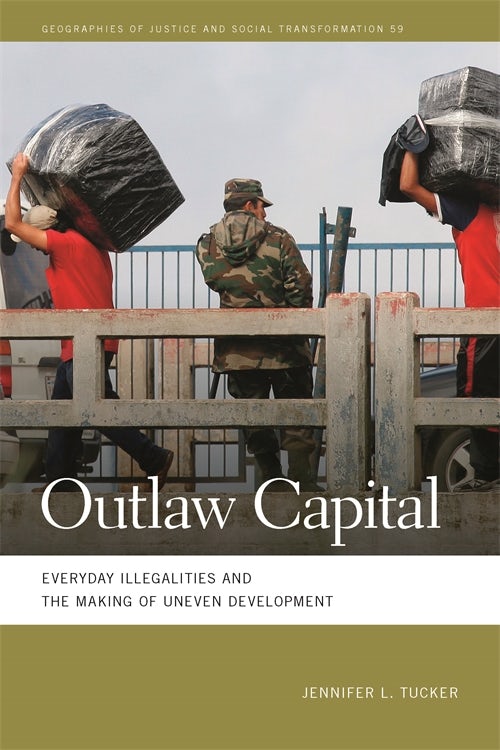
From the Press: “ Outlaw Capital [shows] how uneven development and the Paraguayan state made Ciudad de Este a gray space of profitable transgression. By studying the everyday illegalities of both elite traders and ordinary workers, Jennifer L. Tucker shows how racialized narratives of economic legitimacy across scales—not legal compliance—sort whose activities count as formal and legal and whose are targeted for reform or expulsion.”
Professor Tucker is a scholar of racial capitalism, urban inequality and struggles for social justice. Her research explores how places and practices construed as informal, illegal or lawless buttress networks of elite power and produce different kinds of urban spaces ( Faculty Profile).
See Press page here.
Renia Ehrenfeucht publishes on climate relocation initiatives in the Journal of Planning Literature
With Marla Nelson (University of New Orleans), Renia Ehrenfeucht (Professor of Community and Regional Studies and SA+P Associate Director of Research) published “Towards Transformative Climate Relocation Initiatives” in the August 2023 issue of the Journal of Planning Literature. Ehrenfeucht and Nelson examine how adaptive relocation policy can facilitate community-led opportunities for communities of color and those with lower income, and they offer considerations for designing relocation initiatives that will lead to outcomes that improve people’s well-being.
See Professor Ehrenfeucht’s faculty page here.
Renia Ehrenfeucht and Marla Nelson, 2023, Towards Transformative Climate Relocation Initiatives. Journal of Planning Literature, 38(3) https://doi.org/10.1177/08854122221130287
Jennifer Tucker publishes a symposium on labor in Antipode
In July 2023, Associate Professor Jennifer Tucker (Community and Regional Planning) co-authored a symposium entitled “Outside the Wage: Seeing Politics and Possibilities with Critical Comparisons,” in the journal Antipode. The symposium engaged in debates on the contemporary reconfiguration of work and the shifting understandings of the relationship among and between waged, unwaged, and reproductive labor.
See Jennifer Tucker’s faculty profile here.
Tucker, Jennifer L., Aman Luthra, and Christian Anderson. "Outside the Wage: Seeing Politics and Possibilities with Critical Comparisons." Antipode 55, no. 4 (2023): 989-1003.
Caroline Scruggs publishes an article on potable water re-use in AWWA Water Science
In March 2023, Professor Caroline Scruggs (Community and Regional Planning) co-authored the article “Understanding questions and concerns about potable water reuse: An analysis of survey write-in responses” in the journal AWWA Water Science. Using data from a large public survey with write-in responses, Scruggs and her colleagues analyzed the questions and concerns around potable water reuse amongst Albuquerque residents.
See Caroline Scruggs’ faculty profile here.
Scruggs, Caroline E., Catherine M. Heyne, and Kellin N. Rumsey. "Understanding questions and concerns about potable water reuse: An analysis of survey write‐in responses." AWWA water science 5, no. 2 (2023): e1333.
Katya Crawford publishes article in LA+: Interdisciplinary Journal of Landscape Architecture
Katya Crawford (Professor, Landscape Architecture) published the essay “Let’s Smoke, Walk, and Enter Competitions,” in the Spring 2023 issue of LA+: Interdisciplinary Journal of Landscape Architecture, themed “interruption.” In this essay, Crawford muses on the excitement and promise that is borne out of design competitions, and she argues for the central role that competitions have played in the realization of groundbreaking landscape architecture projects.
See Katya Crawford’s faculty profile here.
Crawford, Katya. "LET’S SMOKE, WALK, AND ENTER COMPETITIONS." LA+: Interdisciplinary Journal of Landscape Architecture 17 (2023)

